Key takeaways:
- Mindful eating enhances the sensory experience of food, fostering awareness of flavors, textures, and emotions connected to meals.
- Practicing mindfulness during eating can improve digestion, reduce emotional eating, and lead to healthier dietary choices.
- Key principles include honoring hunger, eating without distractions, and expressing gratitude for meals to deepen the eating experience.
- Steps to practice mindful eating involve slowing down, fully engaging the senses, and being mindful of portion sizes for a healthier relationship with food.
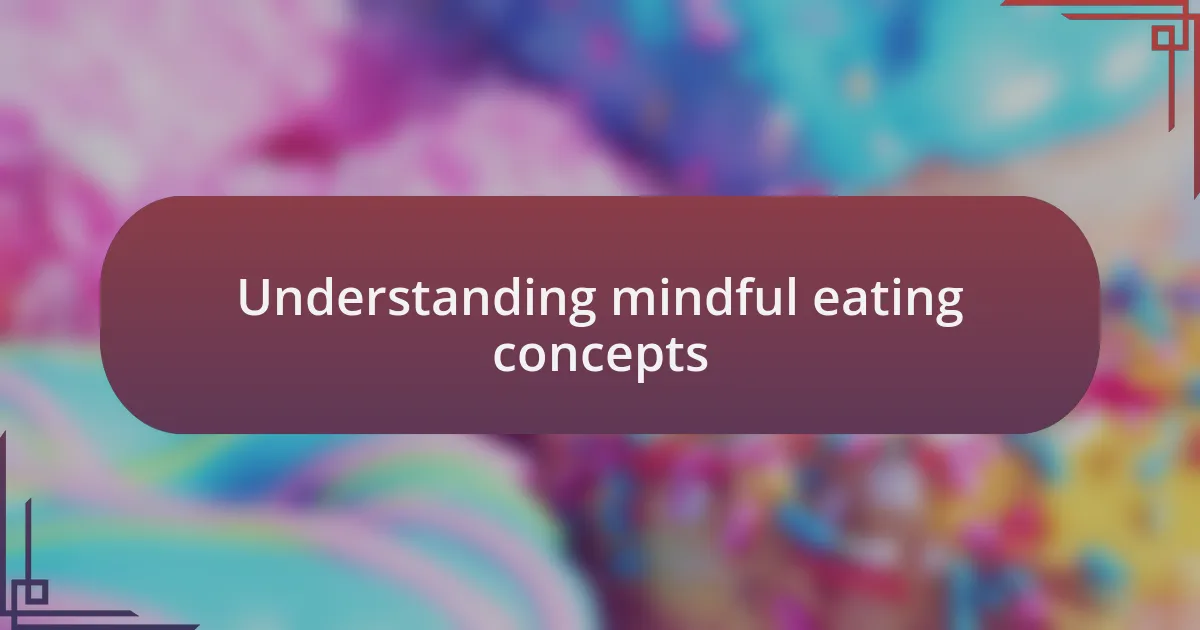
Understanding mindful eating concepts
Mindful eating is about being present with your food; it’s a practice that encourages us to slow down and truly savor each bite. I remember one lunch break where I decided to really focus on my meal instead of scrolling through my phone. The taste of the food was heightened, and I found myself enjoying it more than usual. Have you ever noticed how chaotic eating can become when we’re distracted?
This concept emphasizes awareness of the eating experience, from the flavors to the textures, and even the emotions surrounding our meals. I often find myself reflecting on a particular meal, like the time I indulged in a rich chocolate dessert, feeling both delight and guilt simultaneously. Isn’t it fascinating how our emotions intertwine with our choices? When we acknowledge these feelings instead of brushing them aside, it enriches our relationship with food.
Furthermore, mindful eating invites us to listen to our bodies, recognizing hunger and fullness cues. There was a day I realized I had mindlessly finished a large pizza because it was there, not because I was actually hungry. Reflecting on this, I started to ask myself more often, “Am I eating out of hunger, or is it just habit?” This kind of introspection can transform our eating habits and lead to healthier choices over time.
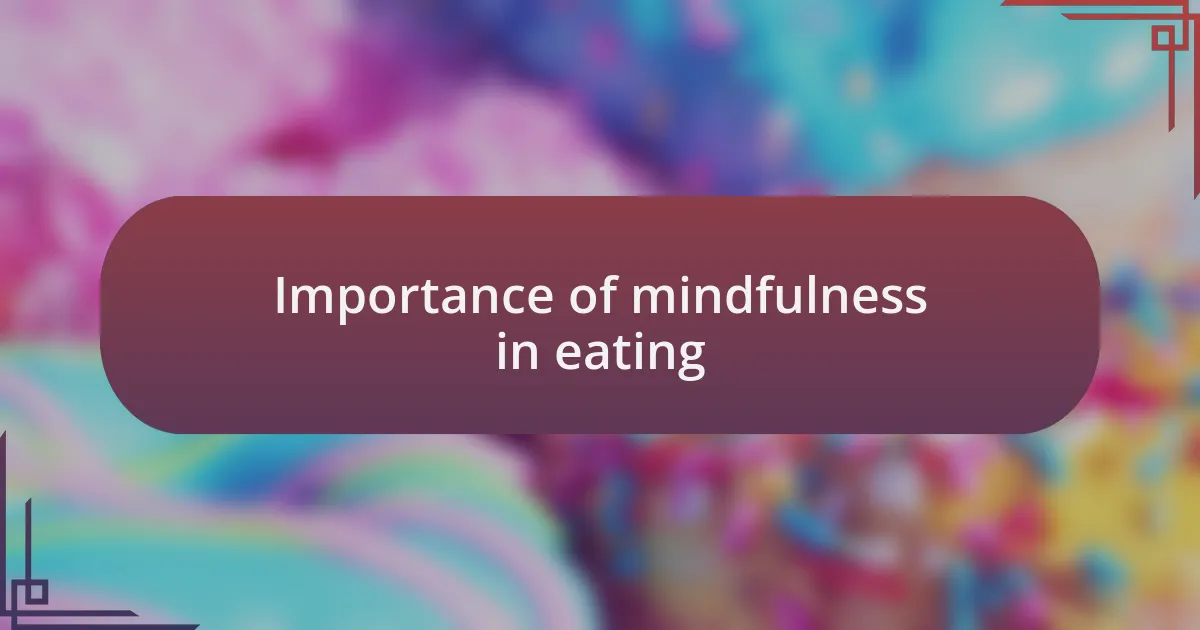
Importance of mindfulness in eating
Practicing mindfulness during meals helps us reconnect with the joy of eating. I recall a dinner where I consciously chose to linger over each bite of a beautifully prepared stir-fry. Instead of rushing through it, I noticed the vibrant colors and the perfect balance of flavors, which transformed an ordinary meal into a delightful experience. Have you ever taken the time to really appreciate how your food looks and tastes?
When we eat mindfully, we cultivate a deeper awareness of our food choices. I remember a moment when I chose to savor a simple bowl of soup. As I took my time, I began to enjoy the warmth and depth of flavors, leading me to appreciate the effort behind the meal. This intentional focus on what we eat can drastically alter our dietary habits, steering us towards healthier options that nourish both body and mind.
Moreover, integrating mindfulness into eating can foster a sense of gratitude. One evening, as I shared a meal with friends, I realized how much love and care went into our dinner preparation. Taking a moment to express gratitude for the flavors and the company heightened my enjoyment and connection to the food. Have you ever paused to think about the journey your meal took before it reached your plate?
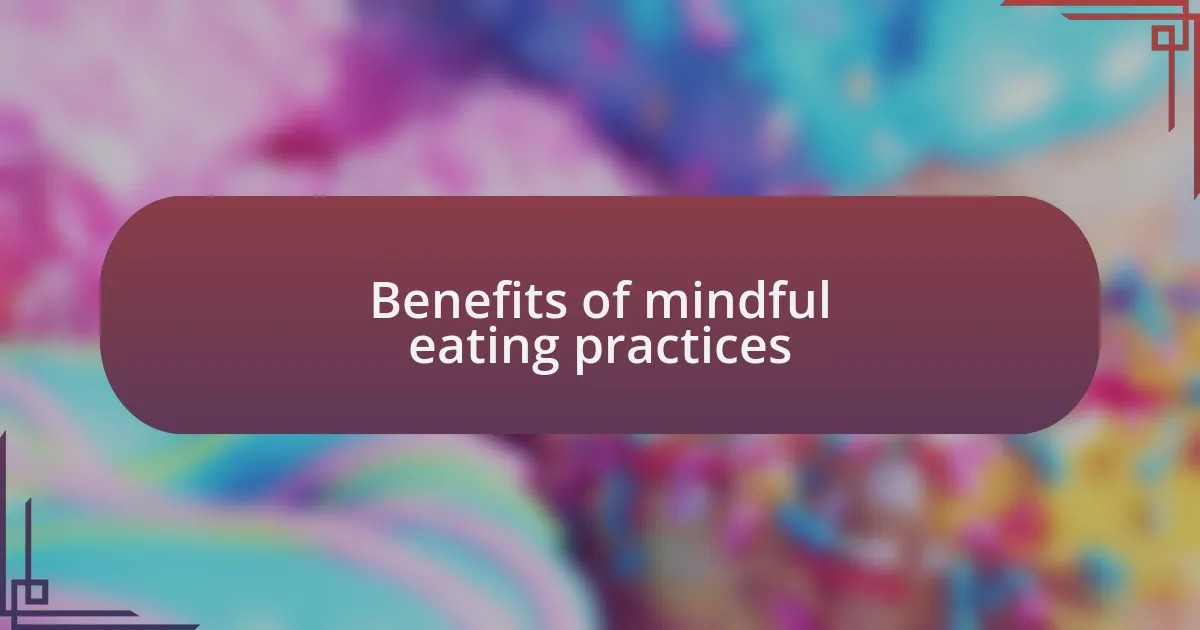
Benefits of mindful eating practices
Mindful eating practices offer numerous benefits, starting with improved digestion. I once noticed how taking smaller bites and chewing more thoroughly during a family dinner eased my stomach afterward. This simple adjustment helped me appreciate my meal while allowing my body to process it better—have you ever considered how your eating pace affects your digestion?
Another significant advantage is enhanced satisfaction with meals. I vividly remember a lunch I had where I deliberately slowed down, engaging my senses. Each bite felt rewarding, and I found that I needed less food to feel content. This experience led me to wonder: isn’t it fascinating that by simply being present, we can change our relationship with food?
In addition, mindful eating can significantly reduce emotional eating. After a particularly stressful day, I caught myself reaching for a bag of chips. Instead, I paused to reflect on my feelings and chose to make a nourishing salad instead. This decision helped me recognize my emotions and to seek comfort in healthier choices, emphasizing the power of awareness. Have you ever tried to identify your emotional triggers around food?
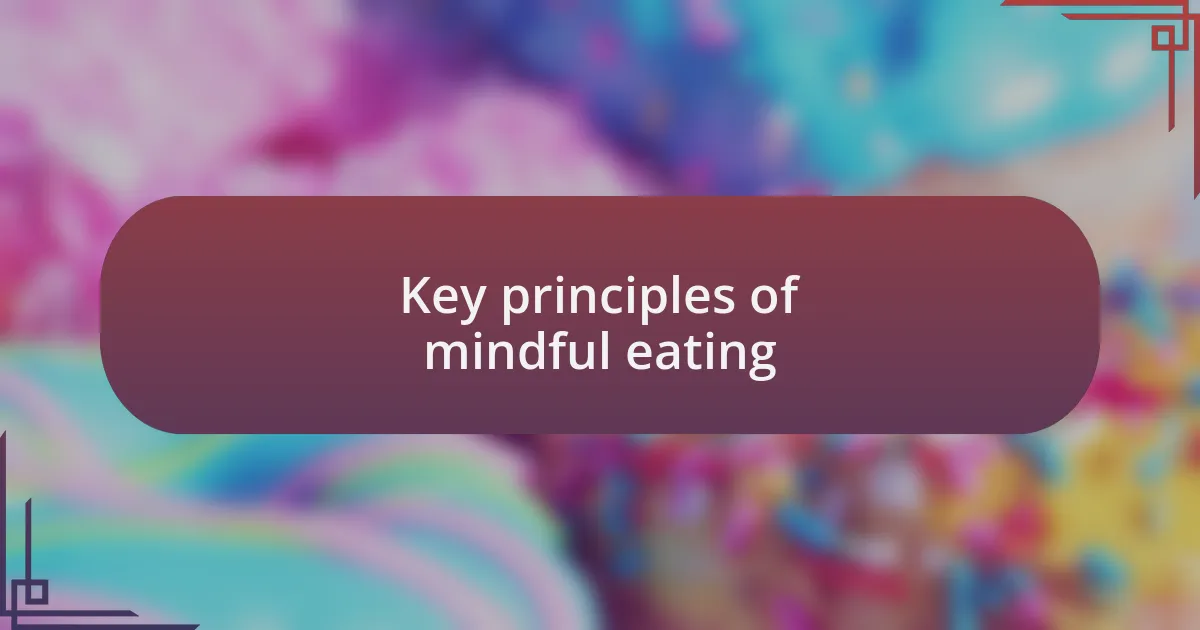
Key principles of mindful eating
When it comes to mindful eating, one key principle is to honor your hunger. I recall a time I was at work and felt the familiar rumble in my stomach, but I dismissed it to meet a deadline. Later, my focus faded, and I ended up overeating at dinner. Have you ever pushed aside hunger just to keep going? Recognizing and responding to hunger cues can transform one’s relationship with food.
Another essential tenet is to eat without distractions. I’ve switched off my phone during meals, and it made a world of difference. I was able to truly enjoy my food, savoring the flavors and textures. Have you noticed how easily we can get lost in screens during meals? By focusing on the food in front of us, we can cultivate a deeper appreciation for our dining experience.
Lastly, practicing gratitude while eating can enhance our mindfulness. I like to take a moment to express gratitude for the meal before taking the first bite. This simple act not only deepens my connection to the food but also enriches my overall experience. Have you ever thought about where your food comes from? Incorporating gratitude fosters a sense of respect and awareness that truly enhances every meal.
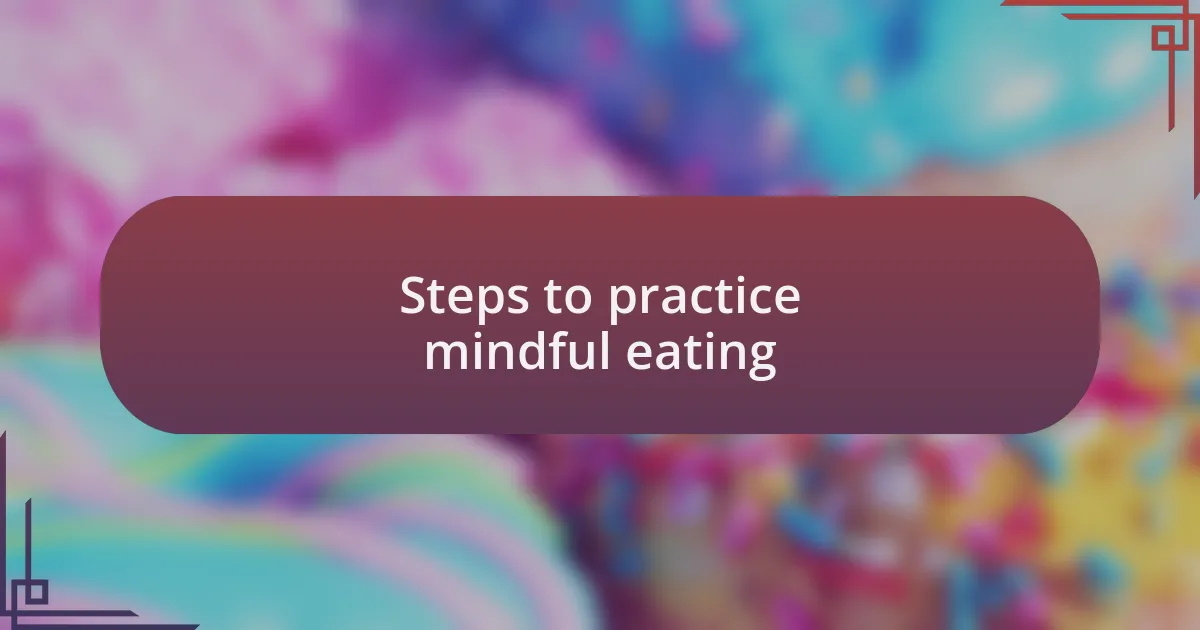
Steps to practice mindful eating
One effective step in practicing mindful eating is to slow down your pace during meals. I remember a time when I devoured my sandwich in just a few bites because I was rushing to finish before a meeting. Looking back, I realized I hadn’t really tasted anything; I was just going through the motions. Have you ever experienced that? By intentionally slowing down, taking smaller bites, and allowing each flavor to linger, we can better appreciate the experience of eating.
Another step is to engage your senses fully. I often close my eyes for a moment before my first bite—just to take in the smell and texture of the meal. It’s a simple act, but it heightens my awareness of the food and enhances my enjoyment. Do you take time to notice the colors or aromas of what you’re about to eat? Engaging our senses immerses us in the moment and can transform even a simple meal into something truly special.
Lastly, be mindful of portion sizes, as this can significantly impact our eating experience. I once found myself serving food directly from family-style platters, and before I knew it, I had helped myself to way more than I needed. Now, I serve a smaller portion first; this helps me reflect on whether I truly want more or if I’m simply eating out of habit. How often do we eat without assessing our true level of hunger? Taking this extra moment can prompt a healthier, more conscious relationship with portions.

Personal experiences with mindful eating
During my journey with mindful eating, I found it helpful to savor each meal completely. One evening, I sat down with a bowl of soup, really focusing on the warmth and aroma wafting up. As I took that first spoonful, I realized how often I rushed through this experience. Have you ever noticed how a moment of mindfulness can turn an ordinary meal into a mini celebration?
I also recall preparing a takeaway meal one night and intentionally arranged my plate, drawing inspiration from those beautiful restaurant presentations. It transformed my dining experience, turning something simple into an aesthetically pleasing delight. When I took the time to appreciate the colors and textures, it made me feel more fulfilled, like I was treating myself to something special. How has your plating experience enriched your meal?
Another significant moment came when I decided to eat without distractions—no phone, no television, just me and my meal. That first experience was almost surreal; it felt like a mini-vacation in my day. I realized how often we eat distractedly, missing the true essence of our food. How liberating is it to connect deeply with our meals, instead of just checking them off a to-do list? Mindful eating has taught me to relish these moments, transforming my relationship with food.